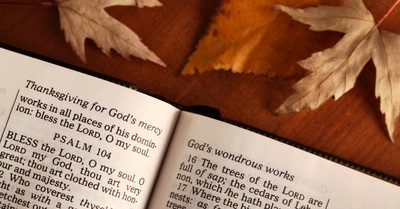
As Americans, I think it’s great that we have the tradition of an annual holiday of giving thanks to God.

As Americans, I think it’s great that we have the tradition of an annual holiday of giving thanks to God.
You can give thanks because God loves you and because He is good. You can give thanks because God is in control of your life. And you can give thanks because, ultimately, God will work all things together for good to those who love Him and are called according to His purpose (see Romans 8:28).
SoCal pastor's journey from addiction and failure to hope and redemption featured in Muscle & Fitness.
The month of November marks the death of John Witherspoon, one of the most important and most underrated of the American founding fathers.
With Thanksgiving in a few days, Native American Christians are providing a different take on the annual holiday.
Here are three specific actions you can take to develop a grateful heart.
Every individual who receives a filter from The Bucket Ministry also hears the Gospel. As a result, the community is being transformed and not only being given generational access to clean water but also eternal life.
This Thanksgiving, it’s appropriate to thank God for our heritage, to remember the warnings of our nation’s forebears, and to pray for renewal in the church and in our nation.
I say all of that to say this: an excellent test of character is to see how sacrificially we serve others when such service does not benefit us personally.
A North Carolina church will serve 1,000 families free Thanksgiving meals this week as part of their annual drive-through charity giveaway.








